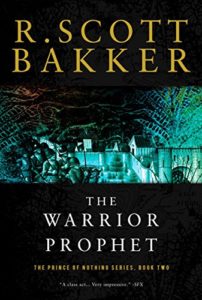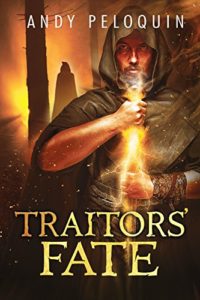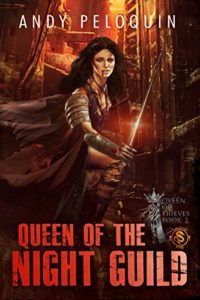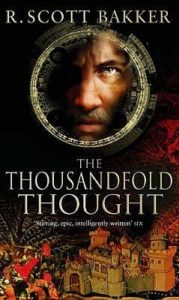Reread of Prince of Nothing Trilogy
Book 3: The Thousandfold Thought
by R. Scott Bakker
The Final March
Chapter 3
Caraskand
Welcome to Chapter Three of my reread. Click here if you missed the Chapter Two!
If soot stains your tunic, dye it black. This is vengeance.
—EKYANNUS I, 44 EPISTLES
Here we find further argument for Gotagga’s supposition that the world is round. How else could all men stand higher than their brothers?
—AJENCIS, DISCOURSE ON WAR
My Thoughts
These two quotes are on the arrogance and delusions of men. The Epistle, which I believe is written by Sejenus, refers to the ridiculous idea that the best way to deal with dirty clothing is to dye it the same color as the stain. Vengeance is an equally poor decision that doesn’t get you clean, but only further soils you. If you think it will accomplish anything, you’re mistaken. Then this is backed up by Ajencis quote that all men think they are better than their fellows. “I’m smarter than him, stronger than him, quicker, faster, sexier,” etc. All those little lies we tell ourselves, all those little recriminations that whisper in our soul to boost our ego. These delusions then lead to greater problems.
At the grand scale: war.
Late Spring 4112 Year-of-the-Tusk, Enathpaneah
Cnaiür is realizing he is a fool, comparing his situation to a greedy Scylvendi who didn’t cull his herd so that his cattle could survive when the dry season comes to the Steppe. Cnaiür’s greed delivered the Holy War to Kellhus. He ponders this sitting in a council chamber watching Kellhus speaking with the other great names. Cnaiür is now constantly accosted by congratulations.
Cnaiür curses himself for looking away every time Kellhus looks at him. He studies Achamian instead, noting the man isn’t “festooned like a slaver’s concubine” like the others. He does notice the look in Achamian’s eye, one Cnaiür recognizes. Like Cnaiür, Achamian can’t quite believe the course of his life. The rest of the great names had been “stripped of the hauteur belonging to their station.” They sit now in silence, no longer bickering.
In the course of a single day, the world these men had known had been struck to its foundation, utterly overturned. There was wonder in that—Cnaiür knew this only too well—but there was an absurd uncertainty also. For the first time in their lives they stood upon trackless ground, and with few exceptions, they looked to the Dûnyain to show them the way. Much as Cnaiür had once looked to Moënghus.
As the last of the Lesser Names hunted seats across the tiers, the rumble of hushed voices trailed into expectant silence. The air beneath the corbelled dome seemed to whine with a collective discomfort. For these men, Cnaiür realized, the Warrior-Prophet’s presence collapsed too many intangible things. How could they speak without praying? Disagree without blaspheming? Even the presumption to advise would seem an act of outrageous conceit.
In the safety of unanswered prayers, they had thought themselves pious. Now they were like boasting gossips, astounded to find their story’s principal in their midst. And he might say anything, throw their most cherished conceits upon the pyre of his condemnation. What would they do, the devout and self-righteous alike? What would they do now that their hallowed scripture could talk back?
Cnaiür almost laughs, but instead spits. He didn’t care what they thought. “There was no honour here, only advantage—absolute and irremediable.” While it lacked honor, it held truth. Cnaiür suffers through the Inrithi’s rituals. As he does, he’s surprised the nobles aren’t jeering like usual, but are weeping. Then he feels the “dread purpose that moved these men.” He remembers their suicidal attack on the Fanim. Starving and dying, facing a large force, they fought with “lunatic determination, enough to shame his Utemot.” He’d witnessed them smiling as they died. He thought these people were the true People of War. Only know does he understand.
Cnaiür had seen it, but he had not understood—not fully. What the Dûnyain had wrought here would never be undone. Even if the Holy War should perish, the word of these events would survive. Ink would make this madness immortal. Kellhus had given these men more than gestures or promises, more even then insight or direction. He had given them dominion. Over their doubts. Over their most hated foes. He had made them strong.
But how could lies do such a thing?
The world these men dwelt within was a fever-dream, a delusion. And yet it seemed as real to the, Cnaiür knew, as his world seemed to him. The only difference—and Cnaiür was curiously troubled by the thought—was that he could, in meticulous detail, track the origin of their world within his, and only then because he knew the Dûnyain. Of all those congregated in this room, he alone knew the ground, the treacherous footing, beneath their feet.
As the Whelming beings, Cnaiür suddenly feels like he is seeing the world from two different perspectives, as if each of his eyes sees something different. He sees the Inrithi perspective of men who just crossed into something profound, cleansed of all their sins, unable, unwilling, to question anything. In the other, he sees it from his own perspective, recognizing how stupid this all was because he “did not stand within the circle of Dûnyain’s deceit.” They weren’t performing a sacred rite but operated a machine like a mill. This was a “way for the Dûnyain to grind these men into something he could digest.” He sees the men the way Kellhus does, as tools.
The Inrithi, Proyas had told him once, believed it was the lot of men to live within the designs, inscrutable or otherwise, of those greater than themselves. And in this sense, Cnaiür realized, Kellhus truly was their prophet. They were, as the memorialist claimed, willing slaves, always striving to bead down the furies that drove them to sovereign ends. That the designs—the tracks—they claimed to follow were authored in the Outside simply served their vanity, allowed them to abase themselves in a manner that fanned their overweening pride. There was no greater tyranny, the memorialists said, than that exercised by slaves over slaves.
But now the slaver stood among them. What did it matter, Kellhus had asked as they crossed the Steppe, that he mastered those already enslaved There was no honour, only advantage. To believe in honour was to stand inside things, to keep company with slaves and fools.
The Whelming ends and Saubon, titular King of Caraskand, is called to account. He refuses to march. He will not relinquish his kingdom even if it damns him. Gotian cries out that Kellhus ordered Saubon to march. Cnaiür hates how unmanly Gotian now sounds. He went from Kellhus’s most vocal opponent to fervent follower. “Such fickleness of spirit only deepened Cnaiür’s contempt for these people.” Saubon refuses to march, claiming he seized this city. Gothyelk points out he had helped. But Saubon does not budge. Chinjosa and Gothyelk mock him while Saubon turns to Proyas for support to his claim. Proyas glances at Kellhus and while he says he won’t break his word to support Saubon’s claim, things have changed.
Cnaiür knows the debate is a sham. Only Kellhus now makes decisions. Everyone turns to Kellhus for his input. Kellhus says that people have to freely chose to make holy war. Saubon realizes that the Dûnyain is forcing Saubon to “choose his own damnation.” Kellhus adds nothing else can be done.
“Strip him of his throne,” Ikurei Conphas said abruptly. “Have him dragged into the streets.” He shrugged in the manner of long-suffering men. “Have his teeth beaten from his head.”
Everyone is stunned into silence by Conphas’s words. He had been silent much of the time, an outcast for being one of the primary conspirator with Sarcellus. “It seemed that his patience had at last been exhausted.” He then remarks that Kellhus should have the power to punish Saubon. Gothyelk calls that insolence and says Conphas doesn’t know what he’s saying. Conphas insists he always does. Then he calls Kellhus a fraud. This promotes outrage while Kellhus only smiles. Kellhus then says, “But this is not what you say.”
It seemed that Conphas sensed, for perhaps the first time, the impossible dimensions of the Dûnyain’s authority over the men surrounding him. The Warrior-Prophet was more than their centre, as a general might be; he was their centre and their ground. These men had to trim not only their words and actions to conform to his authority, but their passions and hopes as well—the very movement of their souls now answered to the Warrior-Prophet.
“But,” Conphas said blankly, “how could another—”
“Another?” the Warrior-Prophet asked. “Don’t confuse me with any ‘other,’ Ikurei Conphas. I am here, with you.” He leaned forward in a way that made Cnaiür catch his breath. “I am here, in you.”
Conphas stammers, “In me,” trying to sneer but it sounds frightened. Kellhus then talks about Conphas’s indecision, how the man doesn’t know how to act now. Kellhus threatens Conphas’s and his uncle’s plans for the Holy War and the Exalt-General is unsure if he should play the sycophant or not. This has led him to try and prove that he is better than Kellhus. “An “obscene arrogance” dwells in Conphas. He believes all men are measured against him. “It is this lie that you seek [Conphas] to preserve at all costs.”
Conphas protests he doesn’t think that. Kellhus asks him how often he thinks of himself as a god. “Never,” he says, nervous. Kellhus then calls out Conphas, saying the man has to lie about who he believes himself to be, a god, “in order to prove” who he is. He has to degrade himself “to remain proud.” Even now, Conphas clings to his self-deception. Outrage explodes from Conphas for being talk to in this way.
“Shame is a stranger to you, Ikurei Conphas. An unbearable stranger.”
Wild-eyed, Conphas stared at the congregated faces. The sound of weeping filled the room, the weeping of other men who’d recognized themselves in the Warrior-Prophet’s words. Cnaiür watched and listened, his skin awash with dread, his heart pounding in his throat. Ordinarily, he would have taken deep satisfaction in the Exalt-General’s humiliation—but this was a different order. Shame itself now reared above them, a beast that devoured all certainties, that wrapped cold coils about the fiercest souls.
Cnaiür wonders how Kellhus can do this even as Kellhus promises Conphas release. For a moment, Conphas appears on the verge of kneeling. And then a mad laugh burst from his lips. Gotian pleads with Conphas to listen to the Prophet. Conphas expression grows blank as Proyas calls Conphas a brother among equals. Their words snap Conphas out of his madness.
Conphas snarls that he’s no “brother to slaves!” He calls them fools for thinking Kellhus speaks the truth about their hearts. Instead, Kellhus uses truth to yoke you into being his slaves. He repudiates them and goes to leave.
“Halt!” the Dûnyain thundered.
Everyone, including Cnaiür, flinched. Conphas stumbled as though struck. Arms and hands clasped him, turned him, thrust him into the center of the Warrior-Prophet’s attention.
Kellhus shouts, “Halt!” and everyone flinches, including Conphas. Then he is dragged back before Kellhus. The nobles cry out for his death. For Conphas to be punished. Conphas appears stunned as he faces Kellhus.
“Pride,” the Warrior-Prophet said, silencing the chamber like a carpenter sweeping sawdust from his workbench. “Pride is a sickness… For most it’s a fever, a contagion goaded by the glories of others. But or some, like you, Ikurei Conphas, it is a defect carried from the womb. For your whole life you’ve wondered what it was that moved the men about you. Why would a father sell himself into slavery, when he need only strangle his children? Why would a young man take the Orders of the Tusk, exchange the luxuries of his station for a cubicle, authority for servitude to the Holy Shriah? Why do so many give, when it is so easy to take?
“But you ask these questions because you know nothing of strength. For what is strength but the resolve to deny base inclinations—the determination to sacrifice in the name of one’s brothers? You, Ikurei Conphas, know only weakness, and because it takes strength to acknowledge weakness, you call your weakness strength. You betray your brother. You fresco your heart with flatters. You, who are less than any man, say to yourself, ‘I am a god.’”
Conphas whispers denial, shame fills the room. A shame greater than Cnaiür’s hatred for the Dûnyain. In this one moment, Cnaiür witnesses the Warrior-Prophet and not a Dûnyain. “For an instant he [Cnaiür] found himself inside the man’s lies.”
Kellhus orders Conphas to disarm his soldiers and go to Jocktha to await passage back to Nansur. He further adds Conphas was never a Man of the Tusk. Conphas is offended by these words, not the previous. He asks why he should do this. Kellhus stands and says he knows that the Emperor made a deal to betray the Holy War before Shimeh. Conphas shrinks from Kellhus and is caught by the faithful.
“Because,” Kellhus continued, looming over him, “if you fail to comply, I will have you flayed and hung form the gates.” The tenor of his voice was such that the word “flay” and the skinless images it conjured seemed to linger.
Conphas stared up in abject horror. His lower lip quivered, and his face broke into soundless sob, only to stiffen, then break again. Cnaiür found himself clutching his breast. Why did his heart race so?
“Release him,” the Warrior-Prophet murmured, and Exalt-General fled through the entrance way, shielding his face, waving his hands as though pelted with stones.
Again Cnaiür stood outside the Dûnyain’s machinations.
Cnaiür thinks the accusation of treachery something Kellhus invented, unable to believe the Nansur Empire would cut a deal with the ancestral enemies. Cnaiür further realizes everything that just happened was premeditated. “Every word, every look, every insight, had some function.” Cnaiür ponders it. It can’t be to remove Conphas since Kellhus could just order his execution. Cnaiür realizes that only Conphas “possessed the force of character” to hold his men’s loyalty. Kellhus couldn’t have competition, but he also couldn’t risk more infighting. That saved Conphas’s life. Kellhus leaves, and Cnaiür watches the Men of the tusk once more with both sets of eyes. The Inrithi think they’ve been forged and tempered of impurities. Cnaiür knows otherwise.
The dry season had not ended. Perhaps it never would.
The Dûnyain simply culled the willful from his herd.
Proyas searches the meeting room for Cnaiür in the wake of Kellhus’s exit. Around him, the nobleman “rumbled amongst themselves, exchanging exclamations of hilarity and outrage” about what had just happened. Proyas notices a shrill cadence to the talk and realizes he feels something is off.
Fear.
Perhaps this was to be expected. As Ajencis was so fond of observing, habit ruled the souls of men. So long as the past governed the present, those habits could be depended on. But the past had been overturned, and now the men of the Tusk found themselves stranded with judgments and assumptions they could no longer trust. They had learned that the metaphor cut both way: to be reborn, Proyas had come to realize, one must murder who one was.
It seemed such a small price—ludicrously small—given what they had gained.
Proyas feels a great deal of guilt for siding against Kellhus and almost murdering “the God’s own voice.” He wishes to undo his actions and can’t. He’s learned that conviction doesn’t equal truth. When two sides of equal fervor fights, one has to be wrong so “what could be more preposterous than claiming oneself the least deluded, let alone privy to the absolution?” When faced with truth, he rejected it for faith. The realization of that had him weeping at Kellhus’s feet. Kellhus had told Proyas not to cry.
“But I tried to kill you!”
A beatific smile, jarring given the obvious pain it contradicted. “All our acts turn upon what we assume to be true, Proyas, what we assume to know. The connection is so strong, so thoughtless, that when these things we need to be true are threatened, we try to make them true with our acts. We condemn the innocent to make them guilty. We raise the wicked to make them holy. Like the mother who continues nursing her dead babe, we act out our refusal.”
Kellhus explains that when you believe without proof, you only have conviction. And leads you to turning your beliefs into a God. By explaining Proyas’s actions, he was absolved “as though to be known was to be forgiven.”
Cnaiür appears before Proyas, the Men of the Tusk flinching out of his way. Proyas realizes something about Cnaiür makes men panic, even the most courageous. He emanated a “feral power” and an “absence of constraint.” Cnaiür always stood ready to do violence. Proyas thinks Cnaiür is insane. As he starts to walk with Cnaiür, blind Xinemus grabs his elbow. Proyas leads both men to a quiet alcove and there asks Cnaiür what he thinks. “That Conphas will laugh himself to sleep.” Cnaiür then adds that Proyas didn’t bring him here to ask about his opinion. Xinemus realizes this is a private conversation and says he’ll leave. Proyas realizes Xinemus came because he has no where else to go. He allows him to stay, saying he trusts him.
Cnaiür realizes Kellhus sent Proyas because of Conphas. Proyas agrees and says Cnaiür is to stay behind at Jocktha with Conphas. The barbarian looks on the verge of “howling rage” before stilling himself and stating: “I am to be his nursemaid.”
Proyas breathed deep, frowned at the solicitations of several passerby. “No,” he replied, lowering his voice, “and yes…”
“What do you mean?”
“You are to kill him.”
Iyokus is brought by a servant to a grove at night, moonlight drifting through the branches. He’s told to wait here. He feels that two dozen Chorae bowman surround him, watching him, ready to kill him.
It was an understandable precaution, especially given recent events.
Iyokus is still off-balanced from his conversation with Eleäzaras earlier today upon his arrival from Jocktha. Iyokus has trouble believing that a prophet controls the Holy War and that the Consult existed. But he believes in a few days of meticulous consideration would let him figure out this new order. “He would not break beneath their weight.”
He was disappointed to find Eleäzaras destroyed and thinks a new Grandmaster should be elected. But first he has a meeting with Kellhus, which is why he is waiting in the garden. He studies some dolmens, ancient remains of a time before Caraskand was built. He laments his order’s disdain of the past, instead focusing on the present. If the No-God is real, he realizes, that will change. The past must be studied. The thought frighten him.
Iyokus senses someone with the Mark approaching him. A sorcerer. He resists the urge to make sorcerous light to see, feeling those Chorae around him. Achamian appears before him, confirming the rumor that he was Kellhus’s vizier and taught him the Gnosis. “There was no end to the absurdities, it seemed.” Iyokus calls out a greeting, knowing this must be hard for Achamian to meet with him.
More shadow than man, Achamian paused some fifteen paces away, gazed at Iyokus through hunched tree limbs. His voice was hard. “If an eye offends thee, Iyokus…”
A bolt of terror struck the chanv addict. What was this? Eleäzaras’s drunken warning rang loud in his ears. “Beware the Mandate Schoolman…”
Iyokus asks where Kellhus is. Achamian says he’s indisposed and Iyokus realizes he was tricked into coming. Achamian reminds him of Iothiah and how he searched for Iyokus during his escape. Fear grips the Scarlet Schoolman. He asks what’s going on, and Achamian says he begged Kellhus to do this. Kellhus said yes. Achamian starts performing sorcery.
Iyokus stiffened. “You begged?”
The fire-coal eyes lowered in an unseen nod. Branches and blossoms were etched blood-red against the greater black. “Yes.”
“Then,” Iyokus said, “I shall not.”
Iyokus knows he’s trapped, just like Achamian had been at the Sareotic Library. He begins singing his defenses. Achamian attacks. Iyokus is desperate as words poured out of him. “Passion became semantics, and semantics became real.” He attacks with lightning that sets trees on fire. Achamian is unfazed and walks forward. Iyokus realizes Achamian toys with him. He summons the Dragonhead, the most powerful of his School’s attack. It breaths fire that does little more than crack Achamian’s wards. Achamian continues advancing.
Iyokus screamed the words, but there was a flash of something brighter than lightning. The pure dispensation of force, unmuted by image or interpretation.
Geometries scythed through the air. Parabolas of blinding white, swinging from perfect lines, all converging upon his Ward. Ghost-stone shivered and cracked, fell away like shale beneath a hammer…
An explosion of brilliance, then—
Cnaiür rides without fear through the dark in the Enathpanean hills around the city. He makes camp overlooking Caraskand. As he stares out at the city he knows he is no longer of the People. He grown past them. He could do anything now. “Nothing was forbidden.” He falls asleep dreaming he is bound to Serwë on the Circumfix and having sex with her. She calls him mad.
“I am yours,” he gasped in an outland tongue. “You are the only track remaining.”
A corpse’s gaping grin. “But I’m dead.”
The words drive him awake. He finds himself naked and curled on the grass. He is disturbed by the dream and then she sees Serwë by the fire looking “like an Inrithi goddess conjured from the flames.” He’s shocked. He tries to breathe. Can’t. She smiles and vanishes into the darkness. He chases after her, crying out her name. He catches glimpses of her painted in moonlight dancing from rock to rock. He’s heedless of the dangers as he stumbles down a steep slope.
“You’re mine!” he howled.
She leads him towards the city and vanishes into an olive grove. On the other side, he spots her heading towards the great mounds made by the dead Fanim. His strength leaves him. He’s winded from the long chase. He loses her among the dead but knows she waits.
It seemed he no longer breathed, but could smell the dead as he willed himself up the last fallow slope. The stench soon became overpowering, a sourness so raw, so earthen deep, it clawed convulsions from his stomach. It possessed a flavour that could be tasted only on the bottom of the tongue.
So holy.
Cnaiür throws up before continuing on through the macabre landscape. He finds her with the wagons that were used to bring the dead here. He calls her name and she reveals herself to be a skin-spy. He leaps at her and tackles her to the ground. The fight and she knocks him into a corpse. He rises and the skin-spy just studies him as Serwë’s blonde hair falls away. Cnaiür thinks he’s dead.
Wings flap above. He sees a raven descend and land on a corpse by the skin-spy. Cnaiür is shocked to see it has a human face and speaks with a reedy voice. The Synthese talks about the covenant he has with Cnaiür’s people. Cnaiür says not part of the People. The voice says something binds him to Kellhus, driving Cnaiür to save him and kill the Synthese “child.” Cnaiür says nothing binds him.
“But the past binds us all, Scylvendi, as the bow binds the flight of an arrow. All of us have been nocked, raised, and released. All that remains is to see where we land… to see whether we strike true.”
Cnaiür can’t breath. He feels chewed up. Then the Synthese say he knows whom Cnaiür hunts. Cnaiür accuses it of lying, but the Synthese knows that Cnaiür hunts for Kellhus’s father. “The Dûnyain.”
The Chieftain of the Utemot gazed at the thing, his thoughts battered senseless by the chorus of conflicting passions: confusion, outrage, hope… Then at last he recalled the only track remaining—the only true track—though his heart had known it all along. The one certainty.
Hate.
Growing calm, Cnaiür says it’s over. He’s not leaving with the Holy War when it marches. The Synthese is unperturbed, comparing Cnaiür to a piece in benjuka as being moved, but still useful to be used by the Consult.
Eyes tiny and impossibly old. An intimation of power, rumbling through vein, heart, and bone.
“Not even the dead escape the Plate.”
Achamian finds Xinemus drunk in his quarters, coughing hard. Xinemus asks if Achamian did it, he did, and then Xinemus asks if Achamian was hurt. He wasn’t. Finally, Xinemus asks if Achamian has them. He does.
“Good… good!” Xinemus said. He bolted from his chair, but with the same rigid aimlessness with which he seemed to do everything now that he and no eyes. “Give them to me!”
He had shouted this as though Achamian were a Knight of Attrempus.
“I…” Achamian swallowed. “I don’t understand…”
“Leave them… Leave me!”
“Zin… You must help me understand!”
“Leave!”
Achamian is startled and goes to leave. Just as he’s about to, he witnesses Xinemus muttering finally under his breath as he heads to a mirror holding the bloody cloth Achamian handed over. For a long moment “it seemed Xinemus gazed into the phlegmatic pits where his eyes had once laughed and fumed.” Then he opens the cloth and pulls out “Iyokus’s weeping eyes.” Xinemus puts them in his own sockets.
“Open!” the Marshal of Attrempus wailed. He jerked his dead and bloody gaze about the room, pausing for a heart-stopping moment on Achamian. “Ooopen!”
Then he began thrashing through his apartments.
Achamian slipped through the door and fled.
Eleäzaras holds the crying, blinded Iyokus in his room, rocking the man. He asks the man if he still remembers how to see. Iyokus gathers himself, blood trickling like tears down his cheeks. Eleäzaras asks if Iyokus’s remembers the words.
In sorcery, everything depended on the purity of meaning. Who knew what blinding might do?
“Y-yessss.”
“Then you are whole.”
My Thoughts
Accosted by congratulations. The perfect way to describe the feeling when you get praise and know you did not earn it. That squirming guilt in you. Some people are good at ignoring that guilt. Cnaiür, however, knows just how his greed to possess Serwë, to get his vengeance on Moënghus, has left him a herdless fool.
Cnaiür and Achamian both have a lot in common. They both lost the woman they love to Kellhus. They both are dazed by what has happened to them and where they are now. In effect, they are both cuckolds, though we don’t feel that same pity for Achamian that we do for Cnaiür. Achamian never raped and beat Esmenet. He didn’t treat her like an object. Esmenet was never proof of Achamian’s heterosexual prowess like Serwë was for Cnaiür. So how they act is completely different. But both men have had their lives utterly upturned by Kellhus and dragged in his wake.
Cnaiür has only disdain for Achamian. After all, the Breaker-of-Horses-and-Men has a Chorae. He sees no use for Achamian as anything other than a shield of fat for Kellhus to hide behind.
Word of the day “corbelled.” A corbel is “a projection jutting out from a wall to support a structure above it” (The New Oxford American Dictionary). So a corbelled dome is something supported by corbels.
Cnaiür’s observation about what it is like to sit in council with a being you believe to be a god is so on point. How can you argue with God? How can you say he’s wrong? How can you even interpret his commands to fit your outlook, to twist the words around to benefit yourself when he could just say, “Nope, I didn’t mean that.” It has to be overwhelming. No wonder it amuses Cnaiür. He knows the truth.
Having sat through a few Catholic masses, I feel for Cnaiür as he suffers through the “ritual and pageantry.” But these sort of customs bring order and comfort. They’re familiar and keep you locked in a familiar rut. You don’t question when you don’t have to think.
When you can control your doubts, you control your fears. You don’t have to think any longer. Bakker is saying here that this sort of blind faith, the certainty that you know what your doing is so righteous that even if you die, you shall be rewarded, then you don’t need to think. More and more, I am certain the point of this series, the true core of it, is that humans have these incredible brains and we squander them. We waste them in such trivial fashions in so many negative ways. Like muscles not used, we allow our minds to atrophy.
All because we’d rather believe simple lies than complex truth. This is why lies can build something so strong in men. The “fever-dream” simplicity is more appealing than reality.
Cnaiür’s intelligence can give him the power of empathy, but he wars against it. He doesn’t want to pity these men because it reminds him too much of his own weakness. He’s seeing it all play out again, how they have made Kellhus the center of their worlds in the same way as Moënghus. He both understands these men and despise them for their weakness
The religious ceremony, the Whelming, is something Cnaiür notes is a way for the Dûnyain to “grind these men into something he could digest.” In the next series, Kellhus tells Proyas that human souls are the grain with which the gods grind to make their bread. The gods use religion to make souls just right for them to feast on in the afterlife. They use it to prepare them, just like Kellhus is now preparing the Inrithi.
Cnaiür’s musings on the Inrithi’s belief in how they had to submit to greater men’s power is very Nietzschian in its principal. Nietzsche taught that morality existed only to keep us enslaved to religion and society. That is the point of morality. It is the chains that hold civilization together. And that submission is easier when we believe the men we’re submitting to are “great men.” Hence the cult of the “Great Man” who will save us. Whether Obama or Trump in the modern era, people want to submit to this slavery in the belief it will lead to good.
But the truth is, Obama and Trump are no better than you or me. They are just people. Flawed, terrible, broken people. They make mistakes. They commit sins. And yet people have put their faith in these men thinking they will save them.
They can’t.
But it’s a nice deception to have. One most people would rather believe in then reality, and one so seductive in this modern era of social media where some people can just blather their dumb thoughts to the world in a single tweet without spending any time to think about them. We’re throwing off these chains that Nietzsche and Bakker write about, but it’s yet to see if this will truly be a good thing or if we’ll destroy ourselves with nihilism.
Cnaiür is wrong about it being a “fickleness of spirit” in regards to Gotian and the other’s conversion. When humans have their world view so shaken they embrace a new one, they often become fanatics. To prove that they have embraced the “correct truth” they want to prove their virtue. Whether it’s a new convert to Christianity or a person that has embrace veganism, they will be at the most fervent and zealous in these early stages.
Bakker does a nice bit of character reminder with Proyas by showing us that he looks gaunt and old because he stayed on the same starvation diet as his men unlike other great names.
Making decisions with real stakes sucks. It’s easier to let someone else decide, and when that person is distant, like say a deity, you can then interpret their will it to your own wishes while holding that fiction you’re really just following orders. It’s a comfort to people. You can do a lot of horrible things when you’re just following orders. Now poor Saubon isn’t afforded that luxury.
This scene is re-introducing us to the Great Names and the changed dynamics of their meetings now that Kellhus is running things. By having it as Cnaiür’s POV Bakker can write the scene from a passive view point, something reminiscent of third person omniscience, while still giving us character insight into Cnaiür only found with this intimate third-person limited. Cnaiür’s intelligence allows him to decipher many of the subtle dynamics found in the interaction, essentially, making him all-knowing.
Great re-introduction to Conphas with such a callous, imperious decision. Direct. Brutal. Without mercy. Without caring what the others things. Pure Conphas. Note how he’s also described as being the only Great Name to still look like his old self, wearing his Nansur uniform, looking healthy. He didn’t choose to eat the same rations as his man.
Watching Kellhus finally dismantle Conphas is a great scene. He had to get to a position of such overwhelming power to break through the Exalt-General’s pathology. He’s such a sociopathic narcissist he can reinterpret anything to fit his worldview, to hold onto that lie that he is the greatest person who’s ever lived.
When Kellhus talks about pride and how Conphas has long wondered about why men would sell their children into slavery, etc, these are questions Conphas has pondered in the last book. It has got to make him question his doubts in Kellhus’s abilities. But his narcissism is preserving him. It’s the best defense against the Dûnyain. Which sucks, because narcissism is an ugly character defect. Plus, Kellhus can still manipulate you in other ways. But Conphas manages to wiggle through the net in this book and almost ruins things.
Of course, given how powerful Kellhus becomes in this book, he could have easily destroyed Conphas and his army. After all, Achamian did it.
Since all humans are weak in some ways, we admire those who at least appear strong. Who sacrifice. This is why they can inspire us because even if we can’t admit we’re weak, which takes a certain amount of self-honesty not easy to obtain, we want to be better than our baser selves. We want to escape the grip of our weakness in whatever forms they take even as we remain bound to them. Slaves to our baser appetites. Our intellects yearn for freedom. In essence, this is what the Dûnyain have done. But at the same time the conflict between intellect and instinct is what makes us human, sets us apart from the beasts and the machines.
Since the Circumfix, Kellhus is no longer a Dûnyain. He has gone past it. Cnaiür is catching a glimpse of it here. Kellhus’s ordeal broke him. The outside has touched him and allowed him to see past cause and effect After all, he had a vision of the Circumfix near the start of Book 2. The No-God and probably Ajolki are affecting him.
Cnaiür steps out of Kellhus’s machinations and thinks Kellhus lied about the deal the Nansur made with the Fanim. It seems so ludicrous to him that such ancient enemies would cut this deal that he reverts to his normal default method of dealing with Kellhus: don’t believe anything he speaks.
“The Dûnyain simply culled the willful from his herd.” Dûnyain philosophy at its simplest. The shortest path. Whatever doesn’t bring about success is a hindrance. Best thing to do is discarded it.
Change is always scary. It sucks not being comfortable, and you can see the great names trying to mask it with bravado through jokes or serious talk. It’s a survival mechanism to deal with this primal instinct in us that was adapted for more immediate dangers.
Proyas has grown as a character. He’s learned that even though conviction and blind zeal can feel great, doesn’t make you right. And now he’s facing the consequences of that both from Achamian’s return and, of course, Kellhus. It’s made him realize the pitfalls and dangerous of zeal. Doubt has to be allowed to temper excessive actions.
We see Proyas realizing that to become a new person, to be reborn, is a scary thing. It’s the unknown. It stepping outside of comfort. It’s something to be afraid of. And it can make a person resist, to fight against it, to murder to protect their status quo. Like Proyas did with Kellhus when condemning him.
Proyas’s guilt is keeping Xinemus in the conversation. Probably sparked by Cnaiür’s disdainful snort, reminding Proyas that everyone thinks Xinemus is useless now and that’s because Proyas didn’t do the right thing but the easy thing.
“The past cannot be bribed, and the future cannot be buried,” says the Scarlet Spire. This saying is a mirror of itself. The past cannot be bribed, but it can be buried. The future cannot be buried, but it can be bribed. They see the past as something they can’t effect, but they can certainly ignore it. But the future is something bursting with possibility. It’s something you can’t ignore, but you can influence.
Iyokus doesn’t even think for a moment that Achamian is here to get vengeance. Iyokus is a very rational person. He compartmentalizes everything. To him, what happened was business. He understands it might be hard for Achamian, but he doesn’t have a problem with meeting as equals now.
Have to give it to Iyokus. He has to think he was about to die, but he doesn’t beg. He doesn’t plead. He realizes it’s not going to work and faces death with dignity, making a contrast to Achamian who had to beg for this privilege. Iyokus appears to draw strength from this, seeing himself as the better man, the stronger one.
As always, sorcery is described with such poetry and beauty, at odds with the death and destruction it wreaks.
Interesting, Cnaiür had a mad grandmother who thought a crow lived in her chest. There may be a genetic component to some mental illnesses.
Notice how when he thinks he’s free, he thinks there’s no lips he could not kiss. He’s accepting his homosexual desires, no longer going to be restrained by his people’s customs.
This is a nice reveal on Bakker’s part. You think Cnaiür has utterly lost his mind. First dreaming about Serwë, then waking up and seeing her. He’s chasing her. It’s impossible. And then it’s revealed she’s a skin-spy, a fusion of the feminine and the masculine, possessing all the things Cnaiür craves: a beautiful woman who proclaims his manhood’s virility while the true thing he desires lurks beneath. His prize has returned to him and giving him the keys to his revenge on Kellhus.
Not even Cnaiür has a stomach strong enough to walk through a carnal pit.
The Consult never discards a useful piece. They use Cnaiür for the same reason they spared Esmenet. They see the world as a game of Benjuka, the rules ever changing. Bakker has used the game for a metaphor for life many times, and has so thoroughly explained it to the readers he doesn’t need to teach you what they’re talking about here. He already has. Well done.
Achamian is disturbed that Xinemus only asks if he was hurt fighting Iyokus more out of habit than actually really caring. Xinemus is too obsessed with getting his “cure.” He’s cracked. It’s one of the saddest scenes in the series to see this once great and noble man so utterly ruined by the world.
Being blinded doesn’t make Iyokus useless in his chosen profession. He can still use sorcery. He can still summon demons through the Daimos. As we see in the sequel series, especially The Unholy Consult, he gets quite skilled at it, second only to Kellhus. Xinemus, on the other hand, has to deal with the end of his martial career on top of the fact he said things he can never forget, words he was forced to speak that have utterly broken him. He’s beyond repair. He’s mad and suffering. Already the cough that will kill him is ravaging his body.
Even though Achamian dealt out his reciprocal justice, it feels hollow because Xinemus still suffers far more than Iyokus even though both men are now blind.
Click here to read Chapter Four!
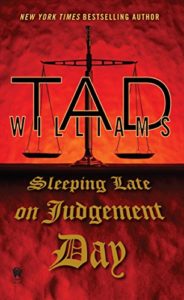 Bobby Dollar (Doloriel to the heavenly host) is an earthbound angel, an advocate fighting to keep souls out of hell. After the events of the last two novels, he is in a whole lot of trouble with Heaven. His personal judgment day approaches and he has to work fast to keep from being damned.
Bobby Dollar (Doloriel to the heavenly host) is an earthbound angel, an advocate fighting to keep souls out of hell. After the events of the last two novels, he is in a whole lot of trouble with Heaven. His personal judgment day approaches and he has to work fast to keep from being damned.
